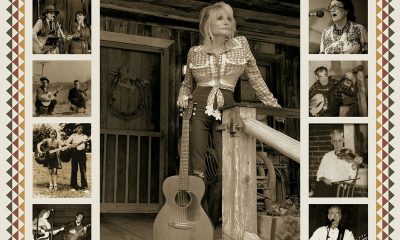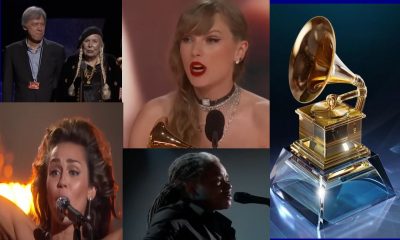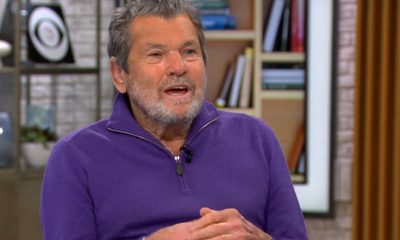a&e features
Alexander the great
Years & Years frontman on his influences, philosophies and being an out pop singer
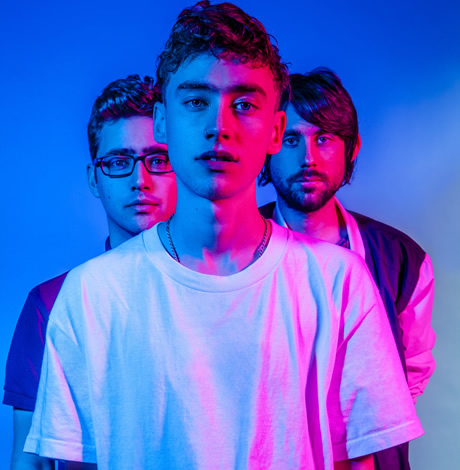
Olly Alexander, lead singer of British electronica-pop band Years & Years, sounds like the guy you meet at the coffee shop who talks to you in a soft-spoken tone about the book he’s currently reading. He gives no indication that Years & Years has won an mtvU award for “Artist to Watch” this year, has millions of views for their music videos on YouTube, and that this is their second-sold out show in D.C.
Years & Years, consisting of Alexander, bassist Mikey Goldsworthy and synth player Emre Türkmen, has been making waves on the music charts with their single “King” reaching number one on the U.K. Singles Chart and their new single “Shine” has already shot to number two. Alexander, 25, met Goldsworthy and Türkmen after they had decided to form a band and became the group’s lead singer and keyboardist. Now, the group will be playing a sold-out show at 9:30 Club on Sept. 19.
Calling from New York City, where Years & Years is preparing for a show before their 9:30 Club appearance, Alexander talked to the Blade about his sexuality, boyfriend and his re-found love for New Age gem shops.
Washington Blade: Lately you’ve been speaking up a lot about how you feel that gay singers should use more same-sex pronouns in their songs. Why do you think that’s so important?
Olly Alexander: Well I think popular culture influences culture. It influences everybody and we should be showcasing different kinds of relationships in our mainstream culture. Not just male and female but male and male and female and female. I think we live in a world where we all know that there are different dynamics. And I think pop music should reflect that and I think why not? Also, I just think it felt empowering personally so I think it could be empowering for other people to do it too.
Blade: Do you make a real effort to try and include same-sex pronouns in your own music?
Alexander: Yeah! I don’t want to dictate how anyone writes a song, that’s not my job at all. But I think I wanted to include it in my own lyrics so I did it in a few songs and it felt good to do that.
Blade: You’re also very open about your relationship with Neil Amin-Smith from the band Clean Bandit. Do you ever worry about people’s reactions to you as an out gay couple?
Alexander: I don’t worry in terms of like a homophobic level. That was never a consideration. I feel like that would be living in fear. I’m a big believer you should never live in fear or shame. Largely the response has been really wonderful and lovely. I think it’s been really kind of humbling for me to meet people who are so welcoming. They’re really grateful that we’ve been open about our relationship. The difficult thing is, you can imagine having a relationship that’s somewhat in the media can have its own pressure regardless if you’re a gay couple or not.
Blade: Were you ever concerned about being out and the lead singer of a band? Did you ever consider not publicly addressing it?
Alexander: I didn’t really consider that. I mean to be honest with all the music and when we made the music video for one of our earlier songs “Real,” you know the song was quite obviously about a boy and we made the video that I thought reflected kind of non-heteronormative sexuality. That was really obvious to other gay people that I was gay that I was singing about a man. So it was so much apart of the music that I would never, ever hide that. It would seem ridiculous to even try and do that.
Blade: This is the second sold-out show that Years & Years has had in D.C. But you haven’t received too much radio play in this area. Do you think that your popularity came from the Internet? What do you think about the Internet’s impact on music artists these days?
Alexander: I think definitely it came from building a following online. The Internet I think has changed the way we listen to music. It’s changed the way we all live and consume music. I think maybe radio and commercial radio used to really determine the acts that kids gravitated towards. Now I think if you can build a fan base online you can go to these places and still have people show up to your shows. It’s kind of amazing.
Blade: When Years & Years first started your sound wasn’t quite as electronic/pop as it is now. What brought about that change?
Alexander: It was just a natural evolution really. When we started we were just using instruments that we had. That was mainly guitars. We gradually began using more synthesizers and making more beats and producing on a laptop. Our tastes were changing and over a few years we discovered what music we enjoyed making and it was kind of electronic sounds. It kind of just came together gradually.
Blade: You’ve also done some acting in television and movies. You even co-wrote the screenplay for the film “The Dish and the Spoon.” Any plans for more acting or screenwriting?
Alexander: I haven’t gotten any plans at the moment. But you never know I might do it again some day in the future.
Blade: A lot of the roles you have done have been straight roles. What made you choose those particular roles?
Alexander: I just really took what I was offered. I just wanted to make some money.
Blade: You’ve mentioned before that your first job was at a New Age gem shop. Are you into New Age things like astrology or tarot cards?
Alexander: Wow, I love that you know that! I’m not so much at the moment. I used to be really into all of that kind of shit. But I went into a New Age-y kind of shop recently and bought a couple crystals. And I felt good about that.
Blade: Have you ever heard a lyric and wished that you had written it?
Alexander: Oh yeah all the time. There’s a really good Jeff Buckley lyric from a song called “Gunshot Glitter.” And the lyric is “I wanna be your lover/Lipstick my name across your mirror.” I really love a Joni Mitchell lyric in “Case of You” I remember that time you told me you said ‘love is touching souls’/surely you touched mine/Cause part of you pours out of me/in these lines from time to time” I really like that one too.
Blade: What do you want people to take away from your music? What do you think makes audiences connect to your music the way that they do?
Alexander: If they take away anything that’s kind of a win for me or make people feel a certain way. But I suppose to move someone and make them feel good or sad or make them think about something. That’s a bonus for me. We have always believe the song has to be like a good song. That’s a certain kind of science we’ve been obsessed with creating, making good hooks and structures. But apart from that we’ve really tried to do everything as authentically as possible. We write all of our own music and write every lyric and every melody. We’ve always been open and honest about that and I hope that connects with people too.
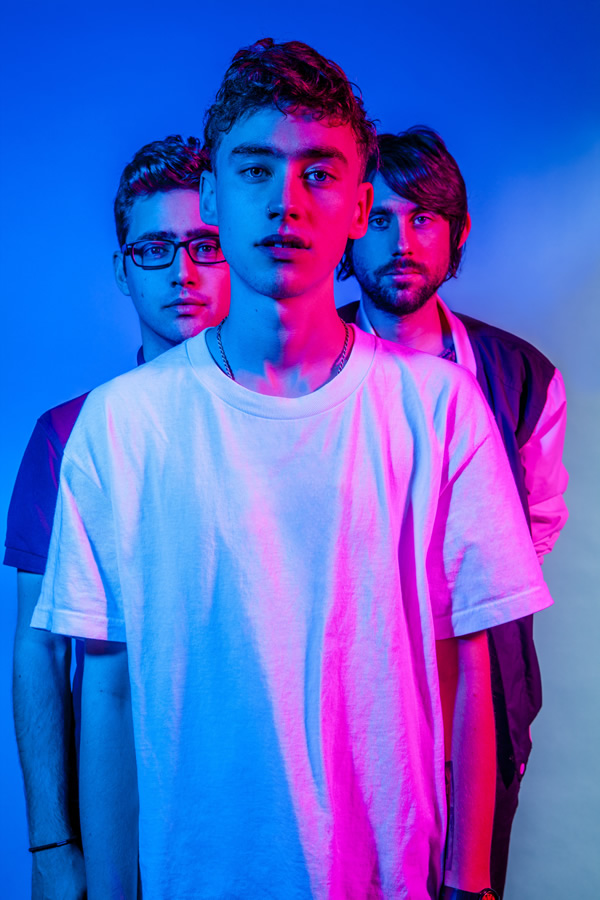
a&e features
Tristan Schukraft on keeping queer spaces thriving
New owner of LA’s Abbey expands holdings to Fire Island, Mexico

LOS ANGELES — Like the chatter about Willy Wonka and his Chocolate Factory, the West Hollywood community here started to whisper about the man who was going to be taking over the world-famous Abbey, a landmark in Los Angeles’s queer nightlife scene. Rumors were put to rest when it was announced that entrepreneur Tristan Schukraft would be taking over the legacy created by Abbey founder David Cooley. All eyes are on him.
For those of us who were there for the re-opening of The Abbey, when the torch was officially passed, all qualms about the new regime went away as it was clear the club was in good hands and that the spirit behind the Abbey would forge on. Cher, Ricky Martin, Bianca del Rio, Jean Smart, and many other celebrities rubbed shoulders with veteran patrons, and the evening was magical and a throwback to the nightclub atmosphere pre-COVID.
The much-talked-about purchase of the Abbey was just the beginning for Schukraft. It was also announced that this business impresario was set to purchase the commercial district of Fire Island, as well as projects launching in Mexico and Puerto Rico. What was he up to? Tristan sat down with the Blade to chat about it all.
“We’re at a time right now when the last generation of LGBT entrepreneurs and founders are all in their 60s and they’re retiring. And if somebody doesn’t come in and buy these places, we’re going to lose our queer spaces.”
Tristan wasn’t looking for more projects, but he recounts what happened in Puerto Rico. The Atlantic Beach Hotel was the gay destination spot and the place to party on Sundays, facing the gay beach. A new owner came in and made it a straight hotel, effectively taking away a place of fellowship and history for the queer community. Thankfully, the property is gay again, now branded as the Tryst and part of Schukraft’s portfolio with locations in Puerto Vallarta and Fire Island.
“If that happens with the Abbey and West Hollywood, it’s like Bloomingdale’s in a mall. It’s kind of like a domino effect. So that’s really what it is all about for me at this point. It has become a passion project, and I think now more than ever, it’s really important.”
Tristan is fortifying spaces for the queer community at a time when the current administration is trying to silence the LGBTQ+ community. The timing is not lost on him.
“I thought my mission was important before, and in the last couple of months, it’s become even more important. I don’t know why there’s this effort to erase us from public life, but we’ve always been here. We’re going to continue to be here, and it brings even more energy and motivation for me to make sure the spaces that I have now and even additional venues are protected going in the future.”
The gay community is not always welcoming to fresh faces and new ideas. Schukraft’s takeover of the Abbey and Fire Island has not come without criticism. Who is this man, and how dare he create a monopoly? As Schukraft knows, there will always be mean girls ready to talk. In his eyes, if someone can come in and preserve and advance spaces for the queer community, why would we oppose that?
“I think the community should be really appreciative. We, as a community, now, more than ever, should stand together in solidarity and not pick each other apart.”
As far as the Abbey is concerned, Schukraft is excited about the changes to come. Being a perfectionist, he wants everything to be aligned, clean, and streamlined. There will be changes made to the DJ and dance booth, making way for a long list of celebrity pop-ups and performances. But his promise to the community is that it will continue to be the place to be, a place for the community to come together, for at least another 33 years.
“We’re going to build on the Abbey’s rich heritage as not only a place to go at night and party but a place to go in the afternoon and have lunch. That’s what David Cooley did that no others did before, is he brought the gay bar outside, and I love that.”
Even with talk of a possible decline in West Hollywood’s nightlife, Schukraft maintains that though the industry may have its challenges, especially since COVID, the Abbey and nightlife will continue to thrive and grow.
“I’m really encouraged by all the new ownership in [nightlife] because we need another generation to continue on. I’d be more concerned if everybody was still in their sixties and not letting go.”
In his opinion, apps like Grindr have not killed nightlife.
“Sometimes you like to order out, and sometimes you like to go out, and sometimes you like to order in, right? There’s nothing that really replaces that real human interaction, and more importantly, as we know, a lot of times our family is our friends, they’re our adopted family.
Sometimes you meet them online, but you really meet them going out to bars and meeting like-minded people. At the Abbey, every now and then, there’s that person who’s kind of building up that courage to go inside and has no wingman, doesn’t have any gay friends. So it’s really important that these spaces are fun, to eat, drink, and party. But they’re really important for the next generation to find their true identity and their new family.”
There has also been criticism that West Hollywood has become elitist and not accessible to everyone in the community. Schukraft believes otherwise. West Hollywood is a varied part of queer nightlife as a whole.
“West Hollywood used to be the only gay neighborhood, and now you’ve got Silver Lake and you’ve got parts of Downtown, which is really good because L.A., is a huge place. It’s nice to have different neighborhoods, and each offers its own flavor and personality.”
Staunch in his belief in his many projects, he is not afraid to talk about hot topics in the community, especially as they pertain to the Abbey. As anyone who goes to the Abbey on a busy night can attest to, the crowd is very diverse and inclusive. Some in the community have started to complain that gay bars are no longer for the gay community, but are succumbing to our straight visitors.
Schukraft explains: “We’re a victim of our own success. I think it’s great that we don’t need to hide in the dark shadows or in a hole-in-the-wall gay bar. I’m happy about the acceptance. I started Tryst Hotels, which is the first gay hotel. We’re not hetero-friendly, we’re not gay-friendly. We’re a gay hotel and everyone is welcome. I think as long as we don’t change our behavior or the environment in general at the Abbey, and if you want to party with us, the more than merrier.”
Schukraft’s message to the community?
“These are kind of dangerous times, right? The rights that we fought for are being taken away and are being challenged. We’re trying to be erased from public life. There could be mean girls, but we, as a community, need to stick together and unite, and make sure those protections and our identity aren’t erased. And even though you’re having a drink at a gay bar, and it seems insignificant, you’re supporting gay businesses and places for the next generation.”
a&e features
Creator Max Mutchnick on inspirations for ‘Mid-Century Modern’
Real-life friendships and loss inform plot of new Hulu show

It’s been a long time – maybe 25 years when “Will & Grace” debuted – since there’s been so much excitement about a new, queer sitcom premiering. “Mid-Century Modern,” which debuted on Hulu last week, is the creation of Max Mutchnick and David Kohan, the gay men who were also behind “Will & Grace.”
Set in Palm Springs, Calif., following the death of the one of their closest friends, three gay men gather to mourn. Swept up in the emotions of the moment, Bunny (Nathan Lane) suggests that Atlanta-based flight attendant Jerry (Matt Bomer) and New York-based fashion editor Arthur (Nathan Lee Graham) move into the mid-century modern home he shares with his mother Sybil (the late Linda Lavin). Over the course of the first season’s 10 episodes, hilarity ensues. That is, except for the episode in which they address Sybil’s passing. The three male leads are all fabulous, and the ensemble cast, including Pamela Adlon as Bunny’s sister Mindy, and the stellar line-up of guest stars, such as Jesse Tyler Ferguson, Vanessa Bayer, Richard Kind, and Cheri Oteri, keep humor buzzing. Shortly before the premiere of “Mid-Century Modern,” Mutchnick made time for an interview with the Blade.
BLADE: I’d like to begin by saying it’s always a delight to speak to a fellow Emerson College alum. In ways would you say that Emerson impacted your professional and creative life?
MAX MUTCHNICK: I think Emerson was the first place that reflected back to me that my voice, my thoughts were good, and they were worth listening to. I developed a confidence at Emerson that did not exist in my body and soul. It was a collection of a lot of things that took place in Boston, but I mean we can just put it all under the Emerson umbrella.
BLADE: Before “Will & Grace,” you co-created the NBC sitcom “Boston Common,” which starred fellow Emerson alum Anthony Clark. Is it important for you to maintain those kinds of alumni relationships?
MUTCHNICK: Because Emersonians are such scrappy little monkeys and they end up being everywhere in the world, you can’t help but work with someone from Emerson at some point in your career. I’m certainly more inclined to engage with someone from Emerson once I learn that they went to my alma mater. For me, it has much more to do with history and loyalty. I don’t think of myself as one of those guys that says, “Loyalty means a lot to me. I’m someone that really leans into history.” It’s just what my life and career turned out to be. The longer I worked with people and the more often I worked with them, the safer that I felt, which means that I was more creative and that’s the name of the game. I’ve got to be as comfortable as possible so I can be as creative as possible. If that means that a person from Emerson is in the room, so be it. (Costume designer) Lori Eskowitz would be the Emerson version. And then (writer and actor) Dan Bucatinsky would be another version. When I’m around them for a long time, that’s when the best stuff comes.
BLADE: Relationships are important. On that subject, your new Hulu sitcom “Mid-Century Modern” is about the longstanding friendship among three friends, Bunny (Nathan Lane), Jerry (Matt Bomer), and Arthur (Nathan Lee Graham). Do you have a friendship like the one shared by these three men?
MUTCHNICK: I’m absolutely engaged in a real version of what we’re projecting on the show. I have that in my life. I cannot say that I’m Jerry in any way, but the one thing that we do have in common is that in my group, I’m the young one. But I think that that’s very common in these families that we create. There’s usually a young one. Our culture is built on learning from our elders. I didn’t have a father growing up, so maybe that made me that much more inclined to seek out older, wiser, funnier, meaner friends. I mean the reason why you’re looking at a mouthful of straight, white teeth is because one of those old bitches sat across from me about 25 years ago at a diner and said, “Girl, your teeth are a disaster, and you need to get that fixed immediately.” What did I know? I was just a kid from Chicago with two nickels in my pocket. But I found three nickels and I went and had new teeth put in my head. But that came from one of my dearest in the group.
BLADE: Do you think that calling “Mid-Century Modern” a gay “Golden Girls” is a fair description?
MUTCHNICK: No. I think the gay “Golden Girls” was really just used as a tool to pitch the show quickly. We have an expression in town, which is “give me the elevator pitch,” because nobody has an attention span. The fastest way you can tell someone what David (Kohan) and I wanted to write, was to say, “It’s gay Golden Girls.” When you say that to somebody, then they say, “OK, sit down now, tell me more.” We did that and then we started to dive into the show and realized pretty quickly that it’s not the gay “Golden Girls.” No disrespect to the “Golden Girls.” It’s a masterpiece.
BLADE: “Mid-Century Modern” is set in Palm Springs. I’m based in Fort Lauderdale, a few blocks south of Wilton Manors, and I was wondering if that gay enclave was ever in consideration for the setting, or was it always going to be in Palm Springs?
MUTCHNICK: You just asked a really incredible question! Because, during COVID, Matt Bomer and I used to walk, because we live close by. We had a little walking group of a few gay gentlemen. On one of those walks, Matt proposed a comedy set in Wilton Manors. He said it would be great to title the show “Wilton Manors.” I will tell you that in the building blocks of what got us to “Mid-Century Modern,” Wilton Manors, and that suggestion from Matt Bomer on our COVID walks, was part of it.
BLADE: Is Sybil, played by the late Linda Lavin, modeled after a mother you know?
MUTCHNICK: Rhea Kohan (mother of David and Jenji). When we met with Linda for the first time over Zoom, when she was abroad, David and I explained to her that this was all based on Rhea Kohan. In fact, some of the lines that she (Sybil) speaks in the pilot are the words that Jenji Kohan spoke about her mother in her eulogy at the funeral because it really summed up what the character was all about. Yes, it’s very much based on someone.
BLADE: The Donny Osmond jokes in the second episode of “Mid-Century Modern” reminded me of the Barry Manilow “fanilows” on “Will & Grace.” Do you know if Donny is aware that he’s featured in the show?
MUTCHNICK: I don’t. To tell you the truth, the “fanilow” episode was written when I was not on the show. I was on a forced hiatus, thanks to Jeff Zucker. That was a show that I was not part of. We don’t really work that way. The Donny Osmond thing came more from Matt’s character being a Mormon, and also one of the writers. It’s very important to mention that the writing room at “Mid-Century Modern,” is (made up of) wonderful and diverse and colorful incredible humans – one of them is an old, white, Irish guy named Don Roos who’s brilliant…
BLADE: …he’s Dan Bucatinsky’s husband.
MUTCHNICK: Right! Dan is also part of the writing room. But I believe it was Don who had a thing for Donny, and that’s where it comes from. I don’t know if Donny has any awareness. The only thing I care about when we turn in an episode like that is I just want to hear from legal that we’re approved.
BLADE: “Mid-Century Modern” also includes opportunities for the singers in the cast. Linda Lavin sang the Jerome Kern/Ira Gershwin tune “Long Ago (And Far Away)” and Nathan Lane and the guys sang “He Had It Coming” from “Chicago.” Was it important to give them the chance to exercise those muscles?
MUTCHNICK: I don’t think it was. I think it really is just the managers’ choice. David Kohan and I like that kind of stuff, so we write that kind of stuff. But by no means was there an edict to write that. We know what our cast is capable of, and we will absolutely exploit that if we’re lucky enough to have a second season. I have a funky relationship with the song “Long Ago (And Far Away).” It doesn’t float my boat, but everybody else loved it. We run a meritocracy, and the best idea will out. That’s how that song ended up being in the show. I far prefer the recording of Linda singing “I’ll Be Seeing You” over her montage in episode eight, “Here’s To You, Mrs. Schneiderman.” We were just lucky that Linda had recorded that. That recording was something that she had done and sent to somebody during COVID because she was held up in her apartment. That’s what motivated her to make that video and send it. That’s how we were able to use that audio.
BLADE: Being on a streaming service like Hulu allows for characters to say things they might not get away with on network TV, including a foreskin joke, as well as Sybil’s propensity for cursing.
MUTCHNICK: And the third line in the show is about him looking like a “reluctant bottom.” I don’t think that’s something you’re going to see on ABC anytime soon. David and I liked the opportunity to open up the language of this show because it might possibly open the door to bringing people…I’m going to mix metaphors…into the tent that have never been there before. A generation that writes off a sitcom because that language and that type of comedy isn’t the way that they sound. One of the gifts of doing this show on Hulu is that we get to write dialogue that sounds a little bit more like you and I sound. As always, we don’t want to do anything just to do it.
BLADE: It didn’t feel that way.
MUTCHNICK: It’s there when it’s right. [Laughs] I want to have a shirt made with Linda’s line, as her mother always used to say, “Time is a cunt.”
BLADE: “Mid-Century Modern” also utilizes a lot of Jewish humor. How important is it for you to include that at this time when there is a measurable rise in anti-Semitism?
MUTCHNICK: I think it’s important, but I don’t think it’s the reason why we did it. We tried very hard to not write from a place of teaching or preaching. We really are just writing about the stuff that makes us laugh. One of the things that makes something better and something that you can invest in is if it’s more specific. We’re creating a character whose name is Bunny Schneiderman and his mother’s name is Sybil and they made their money in a family-run business, it gets Jewy, and we’re not going to shy away from it. But we’re definitely not going to address what’s going on in the world. That doesn’t mean I don’t find it very upsetting, but I’m writing always from the point of view of entertaining the largest number of people that I can every week.
BLADE: “Mid-Century Modern” has a fantastic roster of guest stars including Jesse Tyler Ferguson, Vanessa Bayer, Billie Lourd, Cheri Oteri, Richard Kind, Rhea Perlman, and Judd Hirsch. Are there plans to continue that in future seasons?
MUTCHNICK: Yes. As I keep saying, if we’re so lucky that we get to continue, I don’t want to do “The Love Boat.” Those are fine comic actors, so I don’t think it feels like that. But if we get to keep going, what I want to do is broaden the world because that gives us more to write about. I want to start to introduce characters that are auxiliary to the individuals. I want to start to meet Arthur’s family, so we can return to people. I want to introduce other neighbors, and different types of gay men because we come in so many different flavors. I think that we should do that only because I’m sure it’s what your life is and it’s what my life is. I’ve got a lot of different types. So, yes, we will be doing more.
BLADE: Finally, Linda Lavin passed away in December 2024, and in a later episode, the subject of her character Sybil’s passing is handled sensitively, including the humorous parts.
MUTCHNICK: We knew we had a tall order. We suffered an incredible loss in the middle of making this comedy. One of the reasons why I think this show works is because we are surrounded by a lot of really talented people. Jim Burrows and Ryan Murphy, to name two. Ryan played a very big role in telling us that it was important that we address this, that we address it immediately. That we show the world and the show goes on. That wasn’t my instinct because I was so inside the grief of losing a friend, because she really was. It wasn’t like one of those showbizzy-type relationships. And this is who she was, by the way, to everybody at the show. It was the way that we decided to go. Let’s write this now. Let’s not put this at the end of the season. Let’s not satellite her in. Let’s not “Darren Stevens” the character, which is something we would never do. The other thing that Jim Burrows made very clear to us was the import of the comedy. You have to write something that starts exactly in the place that these shows start. A set comedy piece that takes place in the kitchen. Because for David and me, as writers, we said we just want to tell the truth. That’s what we want to do with this episode and that’s the way that this will probably go best for us. The way that we’ve dealt with grief in our lives is with humor. That is the way that we framed writing this episode. We wanted it to be a chapter from our lives, and how we experience this loss and how we recover and move on.
a&e features
Margaret Cho returns to music with ‘Lucky Gift’
Collection of pop tunes includes tribute to non-binary people
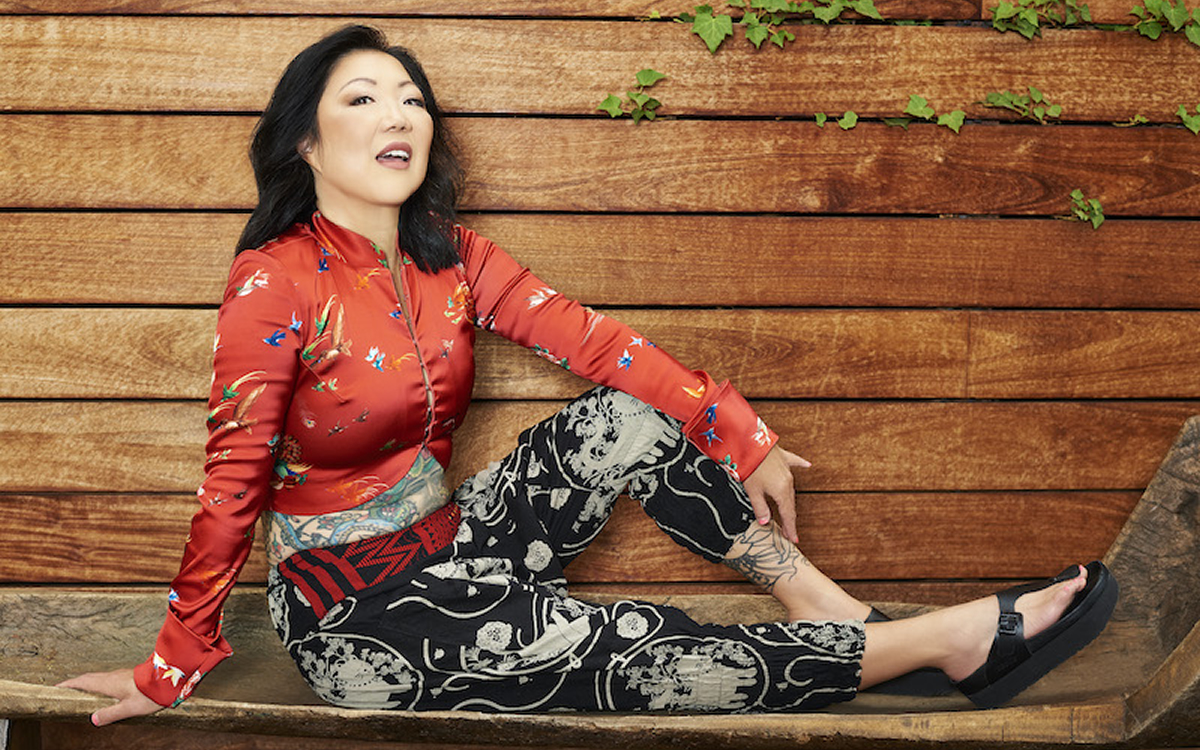
LOS ANGELES — It has been eight years since Margaret Cho released her Grammy-nominated “American Myth” album. She’s back to the music scene with her new album, “Lucky Gift,” an 11-track collection of anthems and pop tunes, a tribute to Robin Williams, and a shout-out to non-binary and gender non-conforming people.
The album captures the whirlwind that is Margaret and all of the different facets of her talents that have made her a powerhouse in entertainment and a leader in activism. In “Lucky Gift,” she’s getting her point across while having fun and getting glam.
We caught up with the activist and artist to chat about her music, our political climate, and the power of pop divas.
Known for her comedy, acting, and activism, she felt it was long overdue to get her music back out there too.
“I make music often. It’s a part of my daily life, it’s a big part of my social life, and it’s just something that I just love to do for my own relaxation and fun. I had enough for an album and I wanted to finally put them out. I was just really proud of how it all sounded together,” shares Cho.
“It’s a power pop record. For me, the songs are really meaningful. They’re all in their own way love songs. I’m a big fan of my own music (laughs), I really like the way that I sound and it’s really special to do. People know me as a comedian, and I have also made music for a long time, but it’s sort of a side project, and so it was time to put more out again.”
Her album also includes a touching tribute to Robin Williams. The entertainment community is finally more comfortable talking about mental health more openly. When relating mental health to her own life, Margaret, in true Margaret form, quickly turned the conversation to reflect today’s political climate.
“I have to maintain a level of peace and quiet and sometimes maybe get away from the news, although that’s tough because I am obsessed. I want to know what is happening. I’m really worried for our community, especially the trans community. I’m worried that this administration is trying to separate T and the Q from the LGBTQIA, and it’s really frightening.”
As an elder, Cho says she has to also remember that we’ve been through this before and it’s actually been much worse. As a community, we’ve been through a similar situation, and we were facing down a pandemic, which was killing us by the millions. So at least now we don’t have to fight AIDS as well as this onslaught of homophobia.
“We have fought for our rights, and we still have them, but we may not have them for long. So our mental health is very important to preserve now because we have to fight. The one thing to remember is they can’t do everything at once. They can’t take away trans rights, queer rights, gay rights, gay marriage, anti-depressants —ha — at the same time. So what we can do is just try to remain as calm as possible and fight as strongly as we can. But yeah, mental health is really vitally important right now.”
Margaret’s long history of queer activism stands for itself. She does not shy away from current issues, she uses her platforms to incite, educate, and question. For Margaret, there is no time off from being an activist. She was born into it, so to speak, being raised in San Francisco in the 1970s, her parents — the owners of a gay bookstore — and their employees followers of Harvey Milk.
“My activism is that I don’t have a choice. I’m going to be an activist no matter what. We’re doing this together, we’re going through this together. I will always be political. It’s just disheartening to see the ignorance of people and the lies that are being told that are believed.”
Margaret’s “Lucky Gift” comes at a perfect time when the queer community can come together over music. Cho looks at her album as a tool to empower an underdog community through the power of music.
“It’s the triumph of pop above all. We need to look to our pop divas above all. So now I’m more than ever, leaning on Madonna. [Thank God for Lady Gaga’s] “Abracadabra” because I think that things like that boost our community so much. When you can just get together and have a “brat summer,” that boosts our community so much in this togetherness, this explosion of excitement. I think Chappell Roan really ignited the pop capacity for healing. I love ‘Lucky Gift’ because it is my stepping into a pop diva moment. Pop divas should not be discounted for how important they are to our society and how much they lift us up.”
In addition to releasing her new album, Cho will continue to hit the road this year with her “Live and LIVID! Tour,” celebrating more than four decades of live stand-up shows. On this tour, she promises to rage about homophobia, sexism, racism, and the fight to stay alive. The five-time Grammy and Emmy-nominated performer is not holding back. According to her, the nation is not divided, just a little lost.
“We’re not divided. Everybody hates this. We all hate this. The fact is, the majority of the country does not want this. Unfortunately, a lot of people just didn’t vote because they just didn’t want to participate. That’s why we’re in the situation that we’re in. So to be on the road is a pleasure. And I rarely come against opposition. Every once in a while there’s something, but it’s something that we all handle. I think we all need a voice, a strong voice of reason to combat all of the hysteria.”
And her message to her fans?
“We’ll get through this. We’ll get through this with pop divas. ‘Abracadabra,’ learn the choreography, you do it sitting down. At least we have pop music, I have my hat in the ring here. But at least we have each other and we’re going to be OK. It’s going to be a ride, it’s going to be intense, but we can do this. We’ve been through this before and we are going to be fine.”
“Lucky Gift”is now available on all major streaming platforms.
-

 Opinions5 days ago
Opinions5 days agoIt’s time for new leadership on the Maryland LGBTQIA+ Commission
-

 The White House4 days ago
The White House4 days agoWhite House does not ‘respond’ to reporters’ requests with pronouns included
-

 Arts & Entertainment5 days ago
Arts & Entertainment5 days ago‘Gay is Good’ Pride Pils Can Celebrates Frank Kameny’s 100th Birthday for WorldPride in D.C.
-

 Sponsored5 days ago
Sponsored5 days agoTHC Drinks: What You Should Know About Cannabis Beverages


